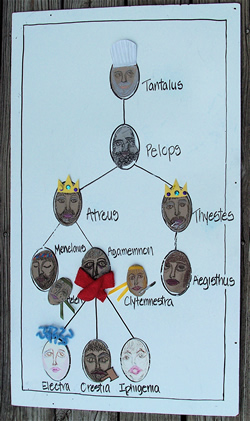
Discussion questions (Nick)
- Family Dynamic: Orestes and Electra hate their mother and love their father despite his killing their sister. Was it loyalty to their father?
- Character Development: As opposed to The Iliad, do we root for and against certain characters?
- Gods: Are there changes in the hierarchy of the gods?
- Cultural Import: Considering the tensions between Athens and Sparta, what points could Aeschylus be making?
- Justice: What does this play say about justice, fairness, and logic?
- Verdict: If you were Athena with the deciding vote, what decision would you make?
Resources by The Teaching Company:
Overview of Orestes’ family tree
- Tantalus: tried to trick the gods, but was caught. Tantalize: temptation without satisfaction, http://en.wikipedia.org/wiki/Tantalus
- Son: Pelops: eaten, reconstructed, cheated in race, won bride, family curse
- Sons: Atreus and Thyestes (twin sons): battled for the throne. Possessor of golden lamb could have throne, Or of someone could move the sun backwards. Both were king at different times.
- Atreus serves up Thyestes’ children, but one survived
- Thyestes’ Son: Aegisthus: abandoned as a child in the woods, found by a shepherd and raised in Atreus’ househould, affair with Clytemnestra, killed Atreus
- Atreus’ Sons: Agamemnon (Married to Clytemnestra) and Menelaus
- Agamemnon’s Children: Iphegenia, Electra, Orestes. Agamemnon’s daughter Iphegenia sacrificed to gain the gods’ favor back to have wind for his ships
Sacrificing and eating of people: 1) 2 Kings 6:24-30 and 2) Egyptians practiced some human sacrificing early on (but not of their own people)
Discussion
Family Dynamic: Orestes and Electra hate their mother and love their father despite his killing their sister. Was it loyalty to their father?
They had no place in their kingdom with her in power. (They’re disenfranchised when they are the rightful heirs.)
Did they really want justice?
Of course, if their father had been around, would they be safe with him? He killed his own child!
Clytemnestra had sent Orestes away; he was resentful of her treatment.
Ideas of the killing seem similar to those in Through Gates of Splendor (Elisabeth Elliott)
The Electra Complex: Falls in love with the father, hates her mother
Avenging Honor: Line 240 (except in Angie’s version) “You light to my eyes, loves in one! I have to call you father, it is fate. And I turn to you the love I gave my mother…
Honor Killing (typically in Muslim countries): done by a father or brother, No witnesses to the killing (family sent away when it happens) http://en.wikipedia.org/wiki/Honor_Killing
Character Development: As opposed to The Iliad, do we root for and against certain characters?
Some character development or at least an understanding of what is going on.
With a play, you have to imagine some of the details.
How did the Chorus help (or not help)? What about them?
The Chorus plays the part of the Furies: Singing in unison, like an opera. Dancing, using instruments, etc.
Did they wear masks? Yes, probably identical masks, but different plays may have had different masks (i.e., old man’s face).
Gods: Are there changes in the hierarchy of the gods?
They were relatively quiet, removed from the situation.
Communicating through dreams, seers, etc.
Fate and the Furies play a greater role.
Zeus appeared higher then Apollo or Athena: Line 625: Bend to the will of Zeus. Line 775: Appeal to Zeus
Zeus charged Orestes to avenge his father’s death.
Some consistency with Zeus’ character as portrayed in the Iliad.
Cultural Import: Considering the tensions between Athens and Sparta, what points could Aeschylus be making?
There was a real war that seems to have been going on, how much is then reflected in these plays?
Was Aeschylus making a political statement? http://en.wikipedia.org/wiki/Aeschylus
http://en.wikipedia.org/wiki/The_Libation_Bearers#The_Libation_Bearers
People wanted to have their peers judge them.
How does this cycle of avenging end? A judgment is made—it’s time to accept it and move on.
Introduction of a voting process: leads to a stalemate that requires the gods to step in and decide.
Tensions spurred on by fear of the Athenians?
“The Just War” doctrine
Athens was started to flourish around 450 B.C.
Eleusinian Mysteries: http://en.wikipedia.org/wiki/Eleusinian_Mysteries (Ancient World Masons)
Aeschylus accused of divulging the mysteries, spared because of war service
This play helps us better understand the Bible through the context of what was happening in the world at that time. This is why God commanded that the Israelites wipe out the pagan cultures. He wasn’t bloodthirsty; it was His way of protecting His people.
Justice: What does this play say about justice, fairness, and logic?
Orestes had an internal struggle about killing his mother, before, during and after.
When speaking to his mother, his bitterness is reflected. “You bore me and threw me away…”
Orestes claims to have been sold into slavery, embarrassed to mention the price.
Killing of mothers, fathers, and children is frowned upon.
Orestes argues that it is worse to kill a man than a woman.
Evidence of juries in Egypt 4000 years ago; idea taken by the Greeks?
Code of Hammurabi: @1760 B.C.
Verdict: If you were Athena with the deciding vote, what decision would you make?
Juries of 500 people: speaks to the vast wealth of the Athenian economy that so many people could serve on a jury
There is a natural inclination to root for the children.
Is there a time for grace and forgiveness?
Helps us to appreciate a justice system and how it protects us.